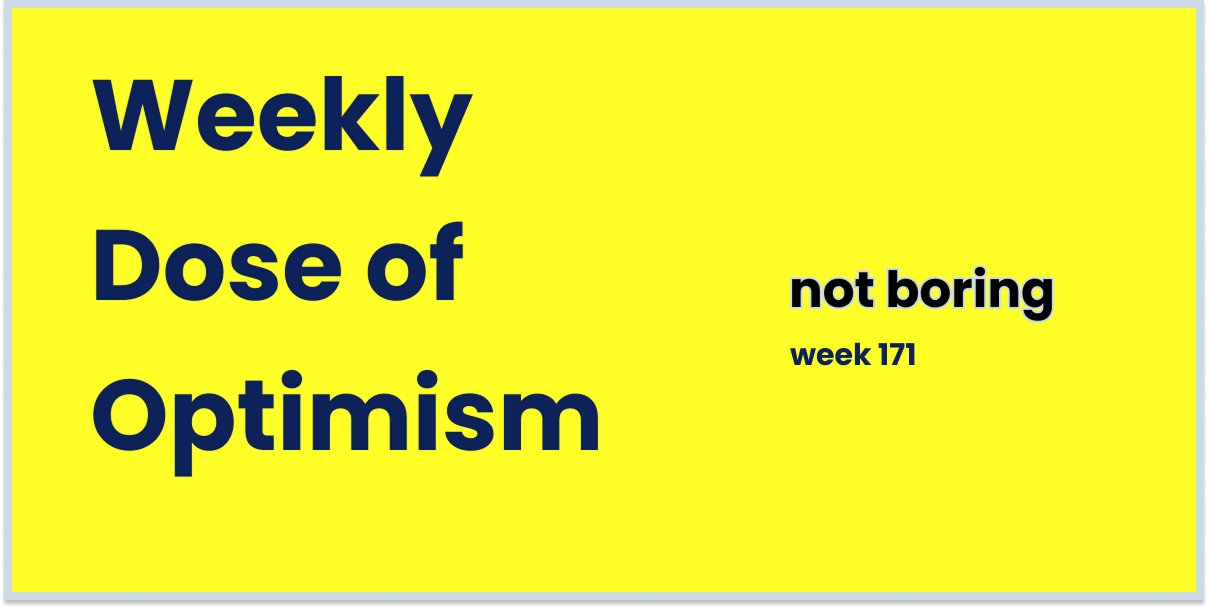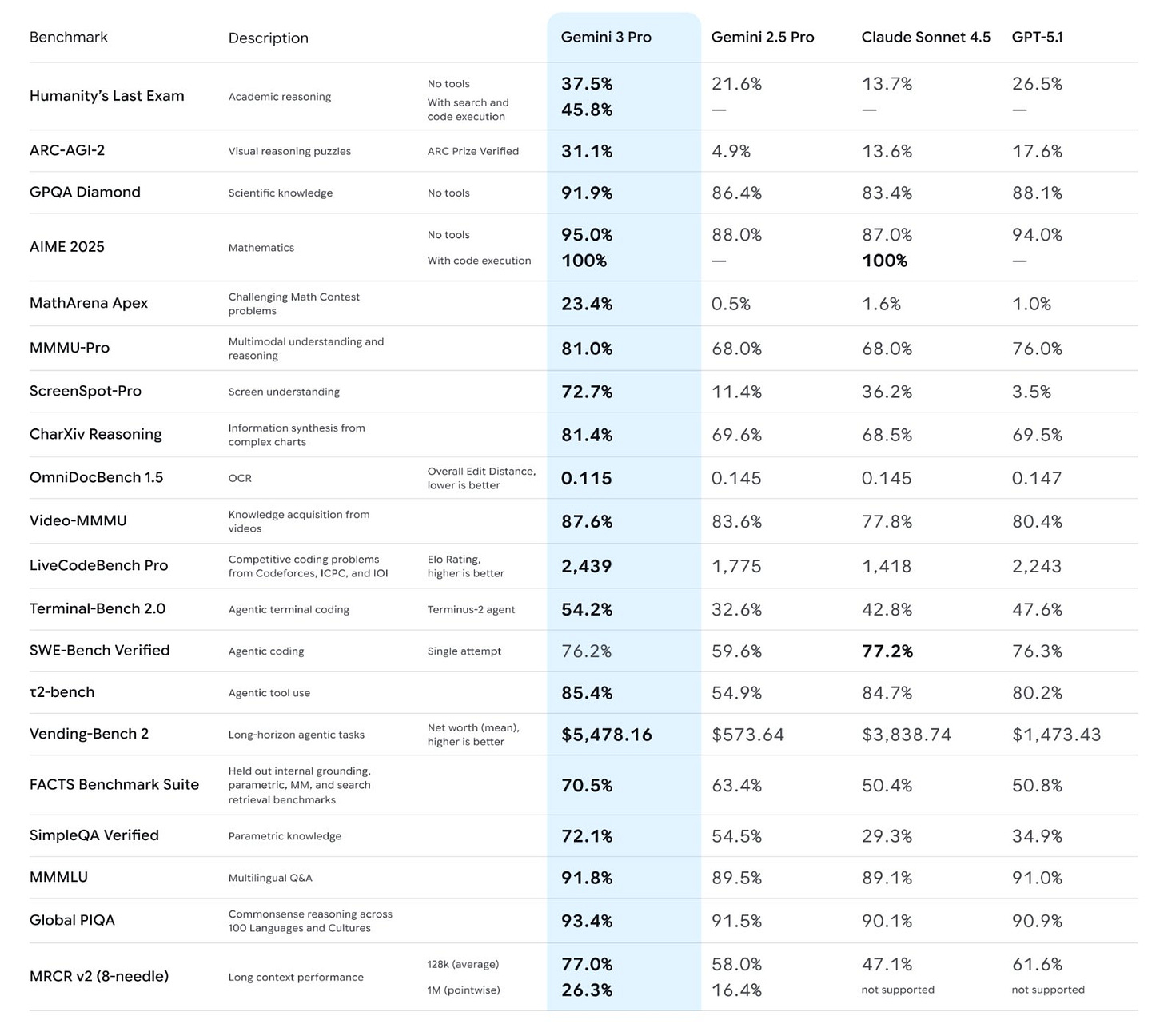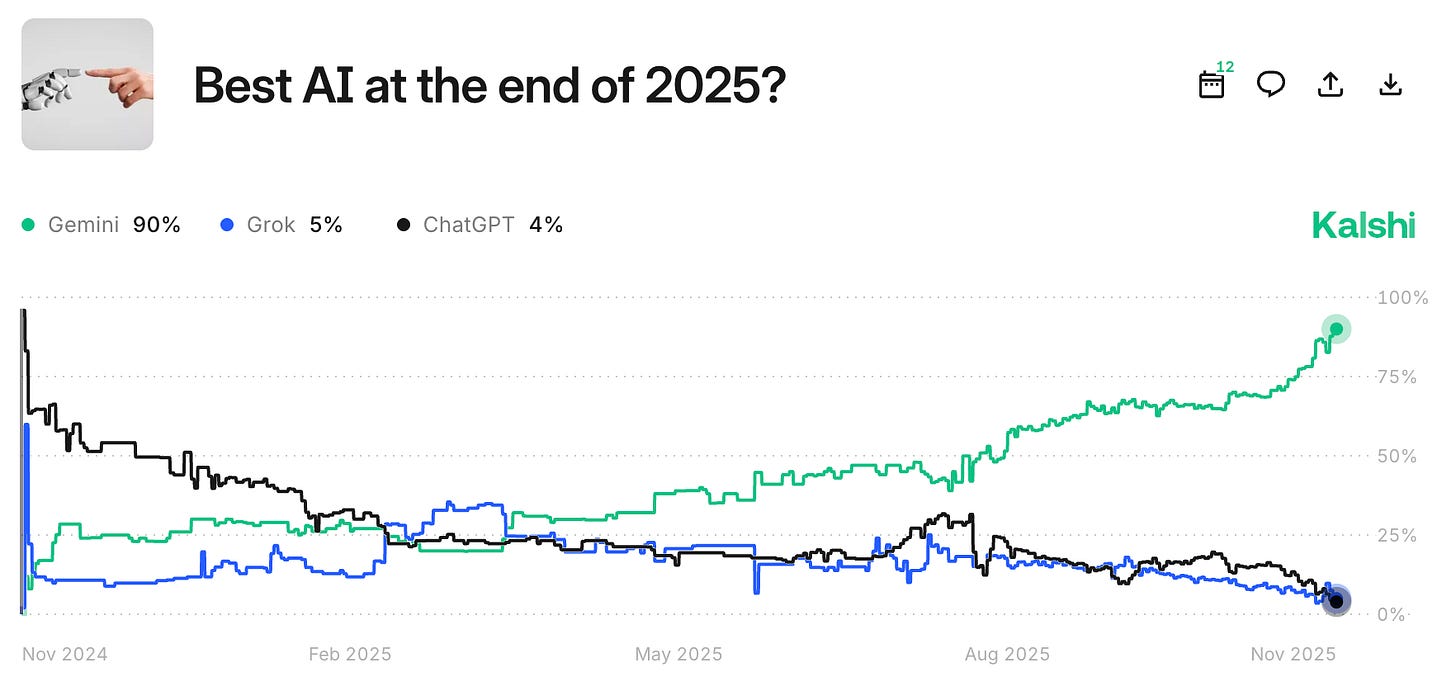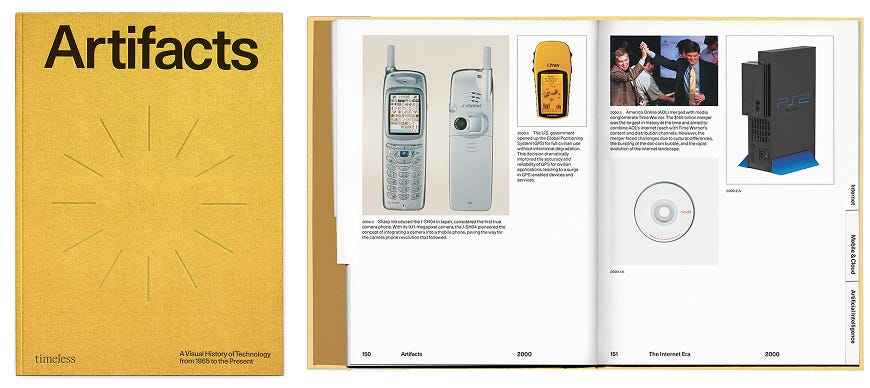Weekly Dose of Optimism #171
General Control, Prometheus, Gemini 3, π*0.6 & Sunday Act-1, Rainmaker, Artifacts, Regulation
Hi friends 👋 ,
Happy Friday and welcome back to our 171st Weekly Dose of Optimism!
I love sending the Dose on weeks like the one we’ve had in the markets this week. We started this thing in the middle of the last bear market to remind people that there is so much good stuff happening that’s going to take longer than a quarter to pay off, and this week, we have a lot of great reminders: epigenetics to fight aging, Bezos tackling real-world AI, Google DeepMind continuing to cook, robots that will do our chores, and a company making it rain.
Let’s get to it.
Today’s Weekly Dose is brought to you by… Stripe Startups
Every venture-backed company — yes, you — should work with Stripe Startups.
Stripe’s mission is to increase the GDP of the internet, and it’s working. Last year, 1.3% of global GDP flowed through Stripe, over $1.4 trillion and growing. 78% of the Forbes AI 50 use Stripe’s financial infrastructure to monetize faster, experiment with pricing, and grow revenue.
As I wrote in my original Deep Dive, Stripe’s strategy from the earliest days has been to make it as easy as possible for startups to begin accepting payments, and then grow with them as they get really big. Little companies become big companies become public companies.
With Stripe Startups, they’re making it even easier.
Stripe Startups is the company’s new program designed to support early-stage, venture-backed businesses as they build, iterate, and scale. Founders enrolled in Stripe Startups get access to credits to offset Stripe fees, expert insights, and a focused community of other founders building on Stripe.
You’re going to use Stripe anyway. Get the white-glove experience.
(1) General Control Comes Out of Stealth to Make Epigenetic Medicines for Aging
Ashlee Vance in Core Memory
General Control seeks to develop compounds that can alter numerous genes in the human body to create lasting effects such as increased muscle mass or better liver function. If the company can do what it hopes, General Control would produce aging therapies far more potent than anything available today.
I’m still not sure whether I want to live forever, but I certainly want to stay healthier, stronger, and smarter as I age. Fortunately, Lada Nuzhna is on the case.
Lada is awesome. I spoke to her a few months ago and saw her present at the Progress Conference recently, and what stands out is that because she comes to biotech from outside of bio (she studied physics), she was able to figure out what she worked on based on what she saw as the most important problems with the right tools to make real progress now, unencumbered by whatever she happened to study for her PhD or what the field believed were best practices. Kind of like JC Btaiche coming to fusion with no college degree and choosing to work on a Z-machine architecture.
In fact, before General Control, she started a grantmaking organization for aging research. As she told Ti in the interview below, she figured out that she wanted to work on aging, and she would have done anything that would have had the most impact, even if it meant working in government. She eventually started this company because she saw that it would finally be the way to make the biggest impact. This company is a Machine for Doing Stuff.
What she chose to do was epigentic editing, using CRISPR “as a kind of GPS system that delivers helpful proteins to exact spots in the genome. Once there, those proteins can switch genes on or off by making the surrounding DNA easier or harder for the cell to read,” as Ashlee Vance writes. Not a new idea, but one she believes is finally safe enough to test on larger populations.
As Aubrey de Grey tweeted, “Lada’s approach would have been entirely impractical even a few years ago, in my view, but with the rapid improvements in tools for both identification and delivery of tissue-specific epigenetic edits, its time has come.” That is the perfect time to start a company.
To start, General Control is going after obesity, liver fibrosis, and muscle loss. One day, hopefully in the next ~50 or so years, it will go after aging itself by eliminating all of the diseases that make it up. Another W for the Thiel Fellowship, btw.
For more, check out Ti Morse’s interview with Lada filmed in a Redwood forest.
(2) Bezos is BACK with Prometheus Week After Flying Closer to the Sun
Cade Metz for The New York Times
Project Prometheus is focusing on technology that dovetails with Mr. Bezos’ interest in taking people to outer space. The company is focusing on A.I. that will help in engineering and manufacturing in a number of fields, including computers, aerospace and automobiles.
Fresh off flying a Blue Origin rocket as close to the sun as its ever flown and landing it back on earth, Jeff Bezos unveiled Project Prometheus.
Details are sparse. What’s known is that Prometheus has $6.2 billion, a team of 100 pulled from OpenAI, DeepMind and Meta, one of the greatest entrepreneurs of all time at the helm, a co-founder, Vik Bajaj, who worked at Google X and co-founded Verily, and ambitions to bring AI to the physical world.
Billionaires get a bad rap (elsewhere, not here, we love billionaires at the Dose and hope all of you become one), but it’s pretty awesome to see Bezos put his vast fortune (and his time) where his mouth is for the good of society. Magnificenza!
(3) Google DeepMind Releases Gemini 3
And I know you probably didn’t realize it, but that image of Jeff Bezos as Prometheus flying too close to the sun in the last one? It wasn’t real. It was generated by Google DeepMind’s new Nano Banana image generator, powered by GDM’s big new brain.
Google DeepMind released its newest model, Gemini 3, this week and blew everyone out of the water. GDM’s odds of having the best AI model at the end of the year jumped to 90% on Kalshi, ahead of Grok then Open AI.
It dropped a new and improved Nano Banana image generator the next day, which people are jazzed about. It can, for example, take a whitepaper and turn it into an image of a chalkboard on which a professor is explaining that whitepaper, with correct summaries.
The Dose has long said that Google DeepMind is the best AI lab. Welcome, everyone.
(4) Good Week to Be a Robot: π*0.6 & Sunday Act-1
If you are someone who enjoys folding boxes, folding laundry, doing the dishes, or making your own espresso, I have bad news for you. For the rest of us, rejoice.
This week, two robotics companies, Physical Intelligence and Sunday, released videos showing their robots handling all of those things for people. Each takes a very different approach.
Physical Intelligence’s new π*0.6 model, which is trained on a lot of video and multi-robot interaction data, and then refined with a novel reinforcement learning (RL) method called Recap, which lets the robots learn from their own successes and failures. π*0.6 “can more than double throughput over a base model trained without RL, and can perform real-world tasks.”
Act-1, which powers Sunday’s cute quasi-humanoid-but-without-two-legs robot, Memo, takes a very different approach. It trains on zero direct robot data, relying instead on high-fidelity human demonstrations captured via custom “Skill Capture Gloves.” Meaning humans wear the gloves while they do things like pick up wine glasses, and the model translates the glove data into robot moves.
The robots are getting better at chores. It’s a great time to be a human.
(5) Rainmaker Begins Largest Cloud Seeding Project in US History in Utah & Idaho
Augustus Doricko for Rainmaker
This month, Rainmaker began the largest cloud seeding project in modern American history. With Utah and Idaho, we are enhancing snowpack across 7,500 square miles of the Bear River Basin.
Let there be rain.
Rainmaker Corporation, the El Segundo-based startup led by Augustus Doricko that we’ve covered a few times in the Dose and in The Great Differentiation, has launched the largest cloud seeding campaign in modern U.S. history, operating across 7,500 square miles of Utah and Idaho in the Bear River Basin.
The plan is to bring lots of water to the critically water-stressed Great Salt Lake, a vital resource for the region’s residents, agriculture, ranching, and broader economy, by flying drones into clouds and sprinkling silver iodide.
Research indicates cloud seeding can increase precipitation by 3-13%, with one documented instance producing 275 acre-feet of additional water in just 24 minutes, enough to support 550 households for a year. Rainmaker’s drone-based approach is a better, faster, cheaper version.
Augustus and the company continue to catch heat for their efforts. Stephen Miller’s wife recently tweeted something confusing cloud seeding with chemtrails. But as our ancestors know, the best cure for heat is a little rain.
BONUS: Artifacts: A visual history of technology from 1965 to the Present.
Gaurav Ahuja at Timeless Partners
Technology is the story of daring optimism. It is the belief that human ingenuity can transform the impossible into the inevitable. From mainframes to microprocessors, from early networks to artificial intelligence, every step forward was driven by the conviction that tomorrow can be greater than today.
My friend Gaurav Ahuja made a book: Artifacts. It’s a beautiful historical tour through the past sixty years of technology, or practically all of technology in the digital age.
Aside from the book itself, what I like about this is that I think Gaurav is building a brand through differentiation as well as anyone in venture for his firm, Timeless Partners. It all fits the theme. The book is about technology through time. Its format, with the tabs, is unique, and rhymes with the blog’s, which itself hosts conversations with people building organizations to last 100 years. In the top right of the website, a clock counts the hundredths of a second.
My book is on the way, and I bet it would make a great gift for the technology lover in your life.
DOUBLE BONUS: Over-Regulation is Doubling the Cost
Peter Reinhardt is one of the examples Trae Stephens and Markie Wagner use in Choose Good Quests to highlight people who’ve plowed software fortunes into Good Quests. After selling Segment, he started Charm Industrial, which does carbon sequestration, and then Revoy, which does electric long-haul trucking.
This week, he wrote a detailed and even-handed blog post on how much pointless regulation is costing his companies, killing other companies, and harming society.
This is not optimistic in and of itself. It’s pretty bleak to read, in fact. But it shows that one of the biggest things standing in the way of progress, abundance, affordability, and a better life for humans isn’t physics, but regulations that could and should be deleted with no harm to anyone. It’s worth fighting to make that happen, and it’s cool to see Peter speak out on it in the face of risk to his companies.
Have a great weekend y’all.
Thanks to Aman and Sehaj for finding the optimism, and for Stripe Startups for sponsoring. Go get the white glove startup treatment.
We’ll be back in your inbox next week. Please block your calendars.
Thanks for reading,
Packy







One thing I’m seeing across multiple sectors is that AI isn’t just accelerating innovation, it’s exposing how little spare power capacity our grids actually have. The next wave of breakthroughs won’t come from chips alone, but from the ability to deliver reliable, high-density electricity at scale.
That’s why firm power, especially nuclear and modular reactors, is starting to show up in the planning discussions for AI infrastructure. Optimism accelerates when the physical layer can keep up.
The Physical Intelligence demo really shows where we're at with embodied AI. What's interesting is how diffrent the training approaches are between π*0.6 and Sunday's Act-1. The RL approach makes sense for repetitive tasks where you can iterate quickly, but I wonder if the human demonstration method will scale beter for more complex, nuanced movements. Either way, having robots that can actually do useful household stuff feels like it's finally happening.